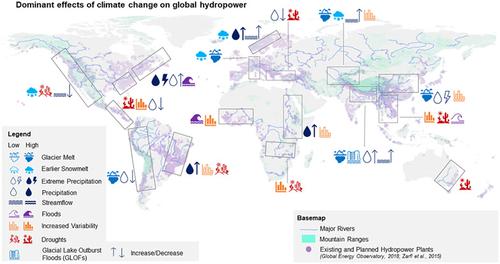当前位置:
X-MOL 学术
›
WIREs Clim. Chang.
›
论文详情
Our official English website, www.x-mol.net, welcomes your
feedback! (Note: you will need to create a separate account there.)
Climate change and the hydropower sector: A global review
WIREs Climate Change ( IF 9.4 ) Pub Date : 2022-01-10 , DOI: 10.1002/wcc.757 Asphota Wasti 1 , Patrick Ray 1 , Sungwook Wi 2 , Christine Folch 3 , María Ubierna 4 , Pravin Karki 5
WIREs Climate Change ( IF 9.4 ) Pub Date : 2022-01-10 , DOI: 10.1002/wcc.757 Asphota Wasti 1 , Patrick Ray 1 , Sungwook Wi 2 , Christine Folch 3 , María Ubierna 4 , Pravin Karki 5
Affiliation

|
Renewable sources of electricity, such as solar and wind, need to be paired with sources of reliable baseload. Hydropower is a renewable, low-emission source of electricity baseload available throughout much of the world as an alternative to electricity conventionally provided by thermal combustion of fossil fuels; however, the global hydropower sector as it stands relies upon surface water flows of substantial and predictable volume. This makes it vulnerable to climate change. The impact of climate change on the hydropower sector is difficult to predict, and not globally uniform. It might be positive, negative, or inconsequential depending upon the local timing and magnitude of changes, reservoir size, allocation priority, and the energy market. The secondary effects of climate change on glacier lake outbursts floods, landslides, and sediment load are poorly understood. In addition, when planning hydropower projects for the future, attention must be given to the greenhouse gas contribution of the impounded waters behind storage dams, and the impact of dams on water temperature. In the past decade, sovereign nations and international development agencies worldwide have evaluated the potential of hydropower as a cost-effective, clean, sustainable option for baseload electricity supply. There is therefore a crucial need to assess the opportunities and risks hydropower poses across a wide range of potential future climate conditions. This review paper conducts a global survey of the literature on the effect of climate change on hydropower and identifies room for improvement in current approaches to evaluation of the net benefits of hydropower projects under climate change.
中文翻译:

气候变化和水电行业:全球回顾
太阳能和风能等可再生能源需要与可靠的基本负荷来源配对。水电是一种可再生、低排放的电力基荷来源,在世界大部分地区都可以使用,可替代传统上由化石燃料热燃烧提供的电力;然而,目前的全球水电部门依赖于大量可预测的地表水流量。这使其容易受到气候变化的影响。气候变化对水电行业的影响难以预测,而且在全球范围内也不尽相同。它可能是积极的、消极的或无关紧要的,这取决于当地的变化时间和幅度、水库规模、分配优先级和能源市场。气候变化对冰川湖爆发洪水、山体滑坡、和沉积物负荷知之甚少。此外,在规划未来的水电项目时,必须注意蓄水坝后蓄水的温室气体排放量以及大坝对水温的影响。在过去十年中,世界各地的主权国家和国际发展机构已经评估了水电作为一种具有成本效益、清洁、可持续的基本负荷供电选择的潜力。因此,迫切需要评估水电在各种潜在的未来气候条件下带来的机遇和风险。本评论文件对有关气候变化对水电的影响的文献进行了全球调查,并确定了当前评估气候变化下水电项目净效益的方法的改进空间。
更新日期:2022-01-10
中文翻译:

气候变化和水电行业:全球回顾
太阳能和风能等可再生能源需要与可靠的基本负荷来源配对。水电是一种可再生、低排放的电力基荷来源,在世界大部分地区都可以使用,可替代传统上由化石燃料热燃烧提供的电力;然而,目前的全球水电部门依赖于大量可预测的地表水流量。这使其容易受到气候变化的影响。气候变化对水电行业的影响难以预测,而且在全球范围内也不尽相同。它可能是积极的、消极的或无关紧要的,这取决于当地的变化时间和幅度、水库规模、分配优先级和能源市场。气候变化对冰川湖爆发洪水、山体滑坡、和沉积物负荷知之甚少。此外,在规划未来的水电项目时,必须注意蓄水坝后蓄水的温室气体排放量以及大坝对水温的影响。在过去十年中,世界各地的主权国家和国际发展机构已经评估了水电作为一种具有成本效益、清洁、可持续的基本负荷供电选择的潜力。因此,迫切需要评估水电在各种潜在的未来气候条件下带来的机遇和风险。本评论文件对有关气候变化对水电的影响的文献进行了全球调查,并确定了当前评估气候变化下水电项目净效益的方法的改进空间。











































 京公网安备 11010802027423号
京公网安备 11010802027423号